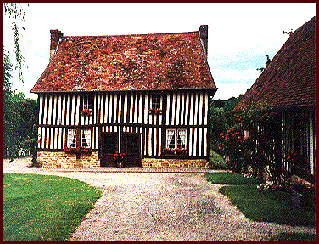
Hendomen 6
Two parishes in Normandy
 An example of the fine half-timbered homes of the
Pays d'auge. Although similar to the black and white structures
of the Welsh Marches they differ in colour. Here in this part
of Normandy the timber is pale brown and the infill is cream.
An example of the fine half-timbered homes of the
Pays d'auge. Although similar to the black and white structures
of the Welsh Marches they differ in colour. Here in this part
of Normandy the timber is pale brown and the infill is cream.The home on the right is that of the proprietaire of the land on which stood Roger de Montgommery's ancestral home - a timber motte and bailey castle.